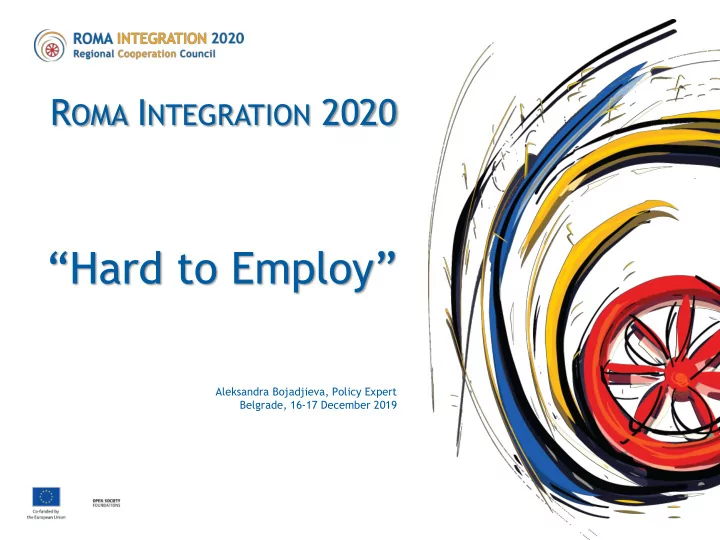

R OMA I NTEGRATION 2020 “Hard to Employ” Aleksandra Bojadjieva, Policy Expert Belgrade, 16-17 December 2019
Roma Integration 2020 action • Phase I: 2016-2018 Phase II: 2019-2021 • Funded by the European Union and the Open Society Foundation • Coverage: Albania, Bosnia and Herzegovina, Kosovo*, Montenegro, North Macedonia, Serbia and Turkey • Partnership with the governments • Topics: housing and employment; horizontal: budgeting and monitoring * This designation is without prejudice to positions on status, and is in line with UNSCR 1244/1999 and the ICJ Opinion on the Kosovo declaration of independence.
Objective and activities • Main objective: reducing the socio-economic gap between the Roma and non-Roma population in the Western Balkans and Turkey and to strengthen the institutional obligations of governments to incorporate and deliver specific Roma integration goals in mainstream policy developments • Key activities • Institutional: technical assistance/capacity building, national platforms • Regional: conferences, task force / high level meetings, analysis, media dissemination, mainstreaming • EU level: participation, contribution
Poznan Declaration • Declaration of WB Partners on Roma Integration within the EU Enlargement Process • Prime Ministers, 5 July 2019 • Targets: • Employment: Increase the employment rate of Roma in the public sector to the rate proportional of the participation of Roma in the overall population; Increase the employment rate among Roma to at least 25 per cent ; • Education: Increase the enrolment and completion rate of Roma in primary education to 90 per cent and the enrolment and completion rate of Roma in secondary education to 50 per cent ; • https://www.rcc.int/romaintegration2020/news/323/declaration-of- wb-partners-on-roma-integration-within-the-eu-enlargement-process
Employment of Roma • EC/UNDP/WB 2017 Regional Roma Survey • Employment rate 60 43 50 42 46 40 37 37 35 40 Percent 40 42 30 27 21 27 20 27 26 23 22 21 19 18 10 14 13 11 0 2011 2017 2011 2017 2011 2017 2011 2017 2011 2017 2011 2017 ALB BIH KOS MNE MKD SRB Roma Non-Roma Poor 3.2
• Employment in the informal sector 85 81 90 75 71 69 80 63 63 57 61 62 70 60 Percent 50 62 39 40 47 30 33 20 27 23 10 21 14 18 17 16 16 0 2011 2017 2011 2017 2011 2017 2011 2017 2011 2017 2011 2017 ALB BIH KOS MNE MKD SRB Roma Non-Roma
Proposed approach • Legalise existing work! • Take into consideration the poverty status • Average income 265 EUR • Social aid beneficiaries • Outstanding debts • Lack of property (legal) • Lack of education and skills • Gradual reduction of social aid and introduction to the formal economy!
Jobs • Predominant • Waste collection • Street vendor • Seasonal (agricultural, construction) works • Cleaning (females) • Standardisation of occupation: • Waste collection (ME) • Roma health mediators (ME) • Roma teaching assistants • RI2020 can partner to further this aspect
Thank you! P: + 381 11 404 68 92 F: + 381 11 404 68 94 A: Ruzveltova 61, Belgrade, Serbia E: aleksandra.bojadjieva@rcc.int U: www.rcc.int/romaintegration2020 F: RomaIntegration2020
Recommend
More recommend